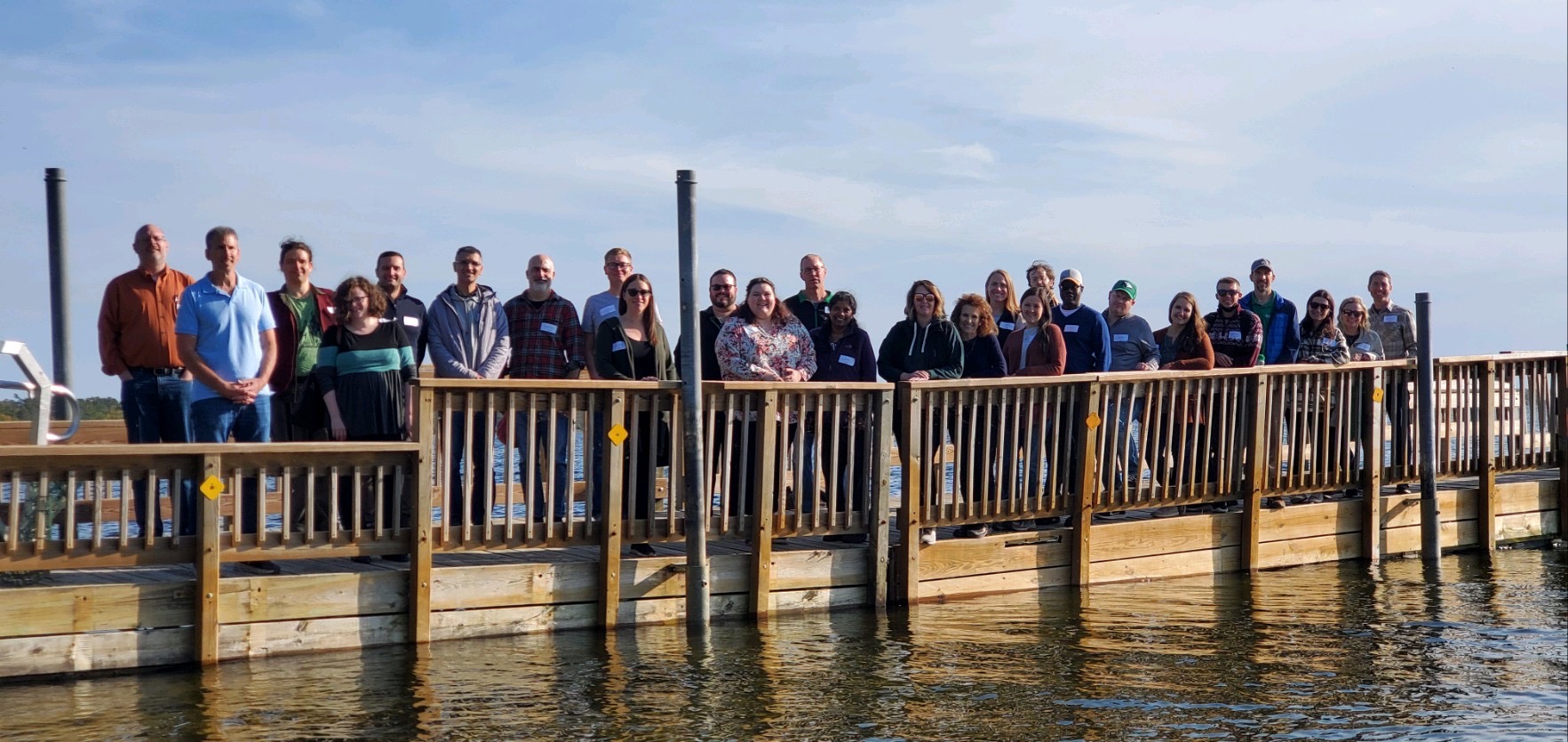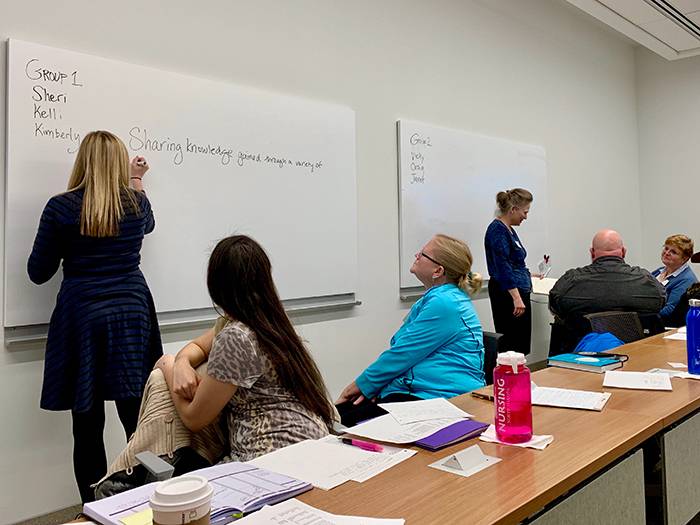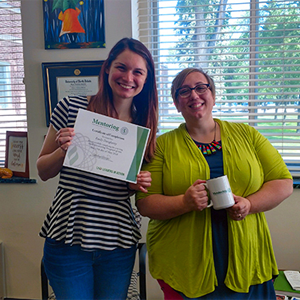Mentoring Programs
UND offers a number of mentoring programs across campus for faculty and staff.
About the Alice T. Clark Mentoring Program
Founded in 1992, the Alice T. Clark Scholars Mentoring Program is an orientation and collegial support program for faculty new to UND. Its purposes are to:
- Assist faculty in developing professional and personal networks.
- Increase faculty awareness of campus culture and resource.
- Support the professional development of faculty as teachers and scholars.
A second year program is offered for those who successfully complete the first year program.
Funded by the UND Foundation, the program is named in honor of retired Vice President for Academic Affairs Alice T. Clark. It is administered through the Teaching Transformation and Development Academy (TTaDA).

2022-23 Cohort
Program Structure
The program consists of two components:
- A one-on-one mentoring relationship with an experienced faculty member.
- A year-long series of monthly cohort meetings in which participants get a chance to meet and talk with key campus figures and to discuss topics of common interest and value to new faculty. (An out-of-town Fall retreat allows for more extended conversations and group socializing.)
Eligibility Requirements
Participation in the program is limited to new full-time faculty holding tenure-track or equivalent positions that require teaching, research/creative activity, and service responsibilities. Those holding temporary positions which are assumed to be permanent may be allowed to participate pending TTaDA approval.
Assistant Professors are given first priority, but others may be included when funding allows.
Eligible faculty receive letters of invitation in mid-August and are asked to obtain supporting signatures from their dean and department chair before the first program meeting in September.
Faculty participants agree to fulfill the following program requirements:
- Attend all monthly sessions, including an overnight retreat in the Fall.
- Participate actively in program meetings and discussions.
- Select and meet regularly with a faculty mentor.
Recognizing that scheduling conflicts do arise, participants are allowed to miss one meeting per year. However, because group coherence is a very important aspect of the program, missing more than once may jeopardize your continuation in the program.
Mentor Component
The mentoring aspect of the Alice Clark Program is fairly informal and flexible. Each program participant selects an experienced faculty member to serve as an informal mentor during the program year. The nature of the mentoring relationship varies depending upon the needs and interests of the new faculty member--teaching, scholarly/creative activity, balancing the workload, personal/family issues, etc.
To assist new faculty in selecting a mentor, the program will supply a list of experienced faculty who have expressed special interest in serving as mentors. However, participants may choose mentors who are not on the list.
Role of the Mentor
Mentors are more experienced faculty members who agree to offer collegial support for an Alice Clark Program participant during the faculty member's first year. They may come from the same department as the new faculty member or from another department on campus.
Mentors are encouraged to meet regularly--at least once a month--with their "mentee" to establish and sustain a collegial relationship. In some cases, mentoring pairs choose to work together on projects, to visit each other's classes, or to attend campus events together. Nearly always, mentors report that they get as much out of the experience as the new faculty member.
Mentors do not receive any compensation for their work, nor do they attend monthly cohort meetings. However, they are invited to attend a special Mentors Lunch in January to discuss issues and questions that may have arisen. And they are also invited to join the new faculty for lunch at the November and May program meetings.
Mentor Orientation
Those who express interest in serving as mentors will be invited to take part in a special Mentor Orientation session held early in the Fall. At that session, we will hear from some recent program participants about what they gained (or hoped to gain) from the experience, and we'll share ideas and information of use to potential mentors.
Effective Mentoring Relationships
Research on mentoring in higher education indicates that good mentors can come from within or outside the department. Over the years, our faculty's selections have been about evenly divided in that regard. Those who select a mentor from outside the department may feel that they are already getting informal mentoring from the department and want to broaden their contacts across campus. Or they may be looking for someone with a specific interest or expertise.
In the Alice Clark program, each mentor pair has some flexibility in defining the mentoring relationship. The following list of suggestions is based both on research about mentoring and on the experience of our mentoring pairs here at UND.
- It's generally best to try to develop a collegial relationship rather than an "expert-novice" relationship. Many new faculty come to us with considerable experience and records of accomplishment, and mentors regularly report that they learn much from their mentees.
- Setting aside a regular time to talk--maybe once every other week or so--is essential for establishing an effective and rewarding mentoring experience. We urge mentors to take the lead in setting up these meetings. A phone call or e-mail is all that's needed.
- Choose a meeting place that is comfortable for both parties. Meeting for lunch or coffee may help ease conversation--especially in the beginning.
- Early in the year, mentor conversations may have as much to do with settling in and getting to know the community as with professional concerns. Later on, it may be helpful to come to each meeting with some specific issue or question in mind, at least to start the conversation.
- At some point during the year, consider sitting in on each other's classes--not to evaluate, just to create common ground for talking about teaching.
- At some point during the year, consider exchanging some piece of scholarly work--again, not to evaluate but to establish common ground for talking about the demands of scholarship.
- Sometimes factors come up during the year that make it hard for mentoring pairs to get together regularly. If a mentoring relationship isn't working out for any reason, talk with Anne or Jeff. It's always possible to make a change in mid-year.
We regret that there is no stipend for mentors. However, mentors are invited to the noon lunch in November and the final Celebration in May. In addition, a mid-year meeting just for mentors is provided, to allow for questions and discussion. Mentors do not attend the regular monthly program meetings.
Advice to New Faculty on Selecting a Mentor
When considering whom to ask to be your mentor, use your own interests and intuitions as a guide. But also ask others for suggestions of people to work with.
If you are interested in finding a mentor from another department, talk to colleagues, past participants in the Alice Clark program, your chair, your dean, and other faculty you've met. Or ask Anne and Jeff for suggestions. Tell them what you're looking for in a mentor (e.g., someone with a shared research interest, someone who teaches similar courses, someone from your part of the country) and keep a list of the names you hear.
Generally speaking, it's good to look for a mentor who has been at UND long enough to be tenured and secure in his/her position. Experienced faculty are usually pleased to be asked, so don't worry about imposing. When you make contact you might want to:
- Schedule an informal meeting first, without bringing up the mentor possibility.
- Let them know how you got their name ("X suggested that you might be a good person for me to get to know").
- When you're ready to ask, do so in such a way that gives them room to decline if they have to ("I know you're very busy. Would you have time to...?").
- Be prepared to answer questions they may have about the ATC program and the role of mentors in the program; give them a copy of the handout on "Effective Mentoring Relationships" if you like--and refer them to Anne if they have questions you can't answer.
- Tell them what you are looking for in a mentor and what you would like to talk about and/or work on with them.
- Give them a day or two to think about it if they need to, but don't let too much time pass.
- If the first person you approach can't do it for some reason, ask if they have suggestions for others you might ask.
- When you make a decision and get a commitment from your mentor, let Anne know right away so we can invite them to the November meeting.
Meeting Schedule 2025 - 2026
First Year
Second Year
About the Clinical Faculty Mentoring Program
Started in 2014, this yearlong mentoring program is offered in collaboration with the College of Nursing & Professional Disciplines and the School of Medicine & Health Sciences.

Kelli Gast (at white board), Kimberly Williams, Sheri Altepeter, Vicky Pizzey, Craig Burns, Janet Jedlicka
Program Structure
The program consists of two components:
- A one-on-one mentoring relationship with an experienced faculty member.
- A year-long series of monthly cohort meetings in which participants get a chance to meet and talk with key campus figures and to discuss topics of common interest and value to new clinical faculty.
Eligibility Requirements
Participation in the program is limited to new full-time clinical faculty from the College of Nursing and the School of Medicine & Health Sciences.
Eligible faculty receive letters of invitation and are asked to obtain supporting signatures from their dean and department chair before the first program meeting in the fall.
Faculty participants agree to fulfill the following program requirements:
- Attend all monthly sessions.
- Participate actively in program meetings and discussions.
- Meet regularly with an assigned faculty mentor.
Recognizing that scheduling conflicts do arise, participants are allowed to miss one meeting per year. However, because group coherence is a very important aspect of the program, missing more than once may jeopardize your continuation in the program.
Mentoring
Each program participant is assigned an experienced faculty member to serve as their mentor during the program year. The nature of the mentoring relationship varies depending upon the needs and interests of the new faculty member--teacher, scholarly/creative activity, balancing the workload, personal/family issues, etc.
Meeting Schedule 2024 - 2025
'24-'25 Meeting Dates
About the Staff Professional Development Program

Program Structure
The UND Staff Professional Development Program is a comprehensive experience designed to elevate your skills, break down silos, and enrich your understanding of the institution. The program fosters meaningful connections with colleagues across campus and promotes personal and professional growth.
Participants will engage in the following components:
- Monthly UND Building Tours.
- Cohort Training and Development Sessions.
- Peer Connection Meetings.
The UND Staff Professional Development Program is more than just a training series—it's an opportunity to build relationships and strengthen the UND community.
Program Requirements
To successfully complete the program, participants must fulfill the following requirements:
- Attend a minimum of 5 Peer Connection Meetings.
- Attend a minimum of 5 out of 7 monthly meetings.
Eligibility Requirements
Participation in the program is limited to benefited-staff off of their probationary period.
• Staff participants agree to fulfill all the previously mentioned program components.
• Staff participants are in good standing and not currently under a disciplinary process.
• Staff participants meets performance for all duties/responsibilities as it relates to their most recent UND performance evaluation.
Recognizing that scheduling conflicts do arise, participants are allowed to miss two cohort meetings. However, because this is a very important aspect of the program, missing more than two may jeopardize your continuation in the program.